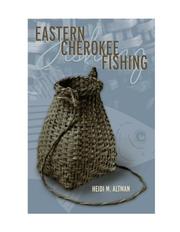| Listing 1 - 2 of 2 |
Sort by
|

ISBN: 0817380450 9780817380458 0817315144 9780817315146 0817315144 9780817315146 0817353313 9780817353315 Year: 2006 Publisher: Tuscaloosa University of Alabama Press
Abstract | Keywords | Export | Availability | Bookmark
 Loading...
Loading...Choose an application
- Reference Manager
- EndNote
- RefWorks (Direct export to RefWorks)
Cherokee identity as revealed in fishing methods and materials. In Eastern Cherokee Fishing, life histories, folktales, and reminiscences about fish gathered from interviews with Cherokee and non-Cherokee people provide a clear and personal picture of the changes in the Qualla Boundary (Eastern Band of the) Cherokee in the last 75 years. Coupled with documentary research, these ethnographic histories illuminate changes in the language, culture, and environment (particularly, aquatic resources) since contact with Europeans and examine the role these changes h
Traditional ecological knowledge --- Traditional fishing --- Cherokee Indians --- Indigenous ecological knowledge --- Indigenous environmental knowledge --- T.E.K. (Traditional ecological knowledge) --- TEK (Traditional ecological knowledge) --- Traditional environmental knowledge --- Ethnoscience --- Experiential learning --- Biopiracy --- Ethnoecology --- Fishing, Primitive --- Primitive fisheries --- Primitive fishing --- Traditional fisheries --- Fishing --- Small-scale fisheries --- Five Civilized Tribes --- Indians of North America --- Iroquoian Indians --- Material culture. --- Fishing. --- Eastern Band of Cherokee Indians of North Carolina --- E.B.C.I. --- EBCI --- Eastern Band of Cherokees --- North Carolina Cherokees --- Eastern Cherokees of North Carolina --- Cherokees Residing in the State of North Carolina --- Carolina Cherokees --- Eastern Cherokees --- Cherokees of Carolina --- Eastern Band of Cherokees of North Carolina --- Cherokee Tribe of North Carolina --- Eastern Band of the Cherokee Nation --- Eastern Band of Cherokee Nation --- Cherokee Nation --- History. --- Ani'-Yun'wiya' Indians --- Anigaduwagi Indians --- Anitsalagi Indians --- AniYunWiYa Indians --- Aniyvwiya Indians --- Keetoowah Indians --- Kituwah Indians --- Tsalagi Indians --- Tslagi Indians
Book
ISBN: 1469648601 146964861X 9781469648606 9781469648613 9781469648583 146964858X 9781469648590 1469648598 9798890850300 Year: 2019 Publisher: Chapel Hill
Abstract | Keywords | Export | Availability | Bookmark
 Loading...
Loading...Choose an application
- Reference Manager
- EndNote
- RefWorks (Direct export to RefWorks)
By 2009, reverberations of economic crisis spread from the U.S. around the globe. As corporations across the U.S. folded, however, small businesses on the Qualla Boundary of the Eastern Band of Cherokee Indians (EBCI) continued to thrive. In this rich ethnographic study, Courtney Lewis reveals the critical roles small businesses such as these play for Indigenous nations. Lewis's fieldwork followed several businesses through the Great Recession and against the backdrop of a rapidly expanding EBCI-owned casino. Lewis's keen observations reveal how Eastern Band small business owners have contributed to an economic sovereignty that empowers and sustains their nation both culturally and politically.
Cherokee business enterprises --- Small business --- Entrepreneurship --- Sovereignty --- State sovereignty (International relations) --- International law --- Political science --- Common heritage of mankind (International law) --- International relations --- Self-determination, National --- Entrepreneur --- Intrapreneur --- Capitalism --- Business incubators --- Businesses, Small --- Medium-sized business --- Micro-businesses --- Microbusinesses --- Microenterprises --- Small and medium-sized business --- Small and medium-sized enterprises --- Small businesses --- SMEs (Small business) --- Business --- Business enterprises --- Industries --- Business enterprises, Cherokee --- Economic aspects. --- Law and legislation --- Size --- Eastern Band of Cherokee Indians --- Eastern Band of Cherokee Indians of North Carolina --- E.B.C.I. --- EBCI --- Eastern Band of Cherokees --- North Carolina Cherokees --- Eastern Cherokees of North Carolina --- Cherokees Residing in the State of North Carolina --- Carolina Cherokees --- Eastern Cherokees --- Cherokees of Carolina --- Eastern Band of Cherokees of North Carolina --- Cherokee Tribe of North Carolina --- Eastern Band of the Cherokee Nation --- Eastern Band of Cherokee Nation --- Cherokee Nation --- Economic conditions.
| Listing 1 - 2 of 2 |
Sort by
|

 Search
Search Feedback
Feedback About UniCat
About UniCat  Help
Help News
News